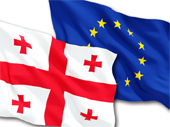Georgian Efforts Mostly Praised by EU in its AA report, Justice Field Still Concerned
By Gvantsa Gabekhadze
Monday, February 4


The report set out the state of play of Georgia’s commitments under the EU-Georgia Association Agreement (AA) since the meeting of the EU-Georgia Association Council on 5 February 2018 and ahead of its next meeting of 5 March 2019.
“The European Union and Georgia have further intensified their relations. Georgia continued consolidating its position as a key partner in the region with its reform efforts and the ambition to further develop its relations with the EU, as highlighted by Georgia’s 5-point reform programme,” the report reads.
The EU believes that the Georgian society continues to show support for Georgia's aspiration of political association and economic integration with the European Union, embodied by the AA. Overall, the implementation of commitments stemming from the AA including its Deep and Comprehensive Free Trade Area (DCFTA) has continued within agreed timelines.
The revised Association Agenda (2017-2020) sets jointly agreed priorities towards further implementation of the AA. The Single Support Framework 2017-2021 indicating priorities for EU financial support contributes to the implementation of the AA and key structural and institutional reforms, in particular in the fields of education and the economic and business environment.
“Collaboration with International Financial Institutions (IFIs) active in Georgia allows for better support to the reform processes driven by the Government of Georgia. New EU assistance programmes (EUR 134 million in grants) will focus on public financial management, security and the rule of law while providing further support for the implementation of the AA. Blending operations will support local currency lending as well as energy efficiency, solid waste management, water supply, and sanitation,” the report reads.
Based on the report the EU is also providing a new Macro-Financial Assistance (MFA) programme to Georgia of up to EUR 45 million (up to EUR 10 million in grants and up to EUR 35 million in loans).
The EU says that in 2017, it was an important trade partner of Georgia with 27% share in its overall trade.
“Preliminary data for 2018 also confirm the importance of the EU as a trade partner for the country. In this context, the opening of the EU market to new animal-origin products from Georgia was an important milestone.”
However, the report reads that Georgia has made “modest progress in reforming the justice sector” and important challenges still remain to consolidate the progress achieved and safeguard the rule of law.
“Concerns have been raised by civil society on potential political interference on the judiciary and on media pluralism. Effective implementation of human rights and anti-discrimination legislation continues to be a challenge.”
The report says that Georgia has benefitted from short-term visa-free travel since March 2017. Between 28 March and 1 September 2018 around 300 000 Georgian citizens enjoyed short-term visa-free travel to the Schengen area.
“Nonetheless, there was still an increase of unfounded asylum requests in a number of EU Member States.”
The EU claims that Georgia is an important partner for the EU in regards to security, the fight against terrorism and transnational organised crime, as highlighted during the second EU-Georgia Security Dialogue of 23 October 2018.
EU says that it continues to firmly support Georgia's sovereignty and territorial integrity within its internationally recognised borders.
Georgian and the EU signed the Association Agreement in 2014, which came into full force in 2016.
